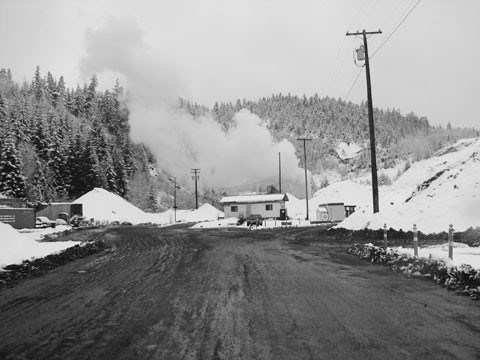Alpine Paving's asphalt plant was a concern for the Whistler Development Corporation as early as 2007, according to affidavits filed in B.C. Supreme Court.
One of the affidavits, filed in court by Alpine Paving owner Frank Silveri in response to a petition against him by the Resort Municipality of Whistler, details a series of meetings in which Whistler Development Corporation (WDC) board members expressed concern about locating the Cheakamus Crossing neighbourhood close to where an asphalt plant was operating.
(The RMOW sent a cease and desist letter to Silveri in April stating: "the operation of the asphalt plant ... on the Site is contrary to the applicable zoning enactment." The petition starts in B.C. Supreme Court Nov. 21.)
Silveri confirms in his affidavit that both Whistler Mayor Ken Melamed and Councillor Ralph Forsyth were members of the WDC board at the time. Other members included Steve Bayly, Duane Jackson and Eric Martin.
Minutes for a WDC board meeting on November 8, 2007, for example, state that, "(the) asphalt plant needs to relocate during and post games." Then minutes for a January 15, 2008 meeting state, "Concern with the smell and noise coming out of the Alpine paving business. Someone at the RMOW needs to look into getting them moved for the sales and occupancy stage."
Tim Koshul, spokesman for the No Asphalt Plant group that's trying to move it away from Cheakamus Crossing, said he was happy that someone on the WDC board spoke up about the asphalt plant back in 2007, but he was disappointed at reading minutes that show board members worrying about selling units over public health.
"I didn't see anything that discussed public health, safety of small children, we need to do more research on asphalt plants to make sure our community is safe," he said. "That troubles me. As I said early in this thing, our shift is from green in environment to green as in money."
The affidavit also includes minutes from a meeting on April 16, 2008, at which it was stated, "The Board requested that Management do some research on finding alternate accommodations for the asphalt plant (Alpine Paving) because of the smell. It will cause us difficulties in marketing the units. Management will find out how long their licence for the site is. The RMOW may have to act."
Then, minutes from a November 16, 2009 meeting indicate public concern rising with regard to emissions from the asphalt plant.
"Management reported that the main public concern is with the emissions and toxic fumes from the plant," the minutes read. "It was agreed that no changes or amendments were to be made to any payment schedules or disclosure statements... The RMOW advised that it was developing a communications strategy for this issue and would include the WDC in its planning."
Koshul was appalled at reading this.
"Someone's talking about toxic emissions at a meeting, and the next minutes are, we need a communications strategy," he said. "Excuse me? Maybe you need a strategy, not a communications strategy."
Later in the affidavit, Mayor Melamed said in an e-mail exchange with then-WDC president Joe Redmond and others between April 29 and May 4, 2010, that the asphalt plant was not raised as an issue at the WDC until April of 2008, despite it coming up at a 2007 meeting at which he was present.
"I've searched my files, going back digitally to late 2004, and found only four references to the Asphalt Plant (all in public meeting documents, all in the last term)," he wrote. "This matches my memory that it was a non-issue around the table. There was speculation that the quarrying operation would find itself under pressure once the village was occupied by local residents but we never contemplated a conflict with the asphalt plant."
Meanwhile, Silveri's affidavit recalls a 2004 meeting he had with Mike Vance, the municipality's general manager of policy and program development, in which they discussed the possibility of continuing operation of the quarry and asphalt plant once the Olympics were over and Cheakamus Crossing was finished.
Silveri was, at the time, considering a purchase of the property where it operated its plant from Sabre Transport Ltd., and he said he wanted to ensure that the municipality had no concerns about the continued operation of the plant before he acquired the property.
At that meeting, Silveri said Vance showed him a drawing that set out the entire area to be developed at Cheakamus Crossing, and that after reviewing the drawing, Vance assured him the municipality had "no objection" to the continued operation of the plant.
Vance submitted his own affidavit as part of the municipality's action against Alpine Paving. In it, he said he first learned that an asphalt plant was operating at a pit near the planned site for Cheakamus Crossing in 2004. At that time, he wrote, the municipality was assessing the lands in the area for the purpose of constructing the neighbourhood.
Vance said in the affidavit that he learned of the plant while reviewing historical municipal records in the context of an environmental study.




